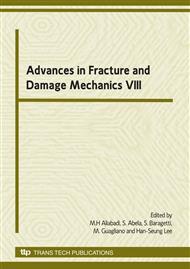p.189
p.193
p.197
p.201
p.205
p.209
p.213
p.217
p.221
Effect of Radical Nitriding on Fatigue Strength of Ni-Base Superalloy
Abstract:
In order to investigate the effect of nitriding on the crack initiation and propagation behavior of Ni-base super alloy, Alloy 718, rotating bending fatigue tests were carried out until 108 cycles at room temperature. By nitriding at 500°C for 12h, compound layer of about 5μm in thickness was formed and the initiation of a fatigue crack was strongly suppressed causing the increase in fatigue strength. A crack initiated in brittle manner at the compound layer in all of fractures. However the crack propagated in ductile manner controlled by the property of the base alloy. That is, there is no or little influence of nitriding on the crack growth rate of the alloy.
Info:
Periodical:
Pages:
205-208
Citation:
Online since:
October 2009
Authors:
Keywords:
Price:
Сopyright:
© 2010 Trans Tech Publications Ltd. All Rights Reserved
Share:
Citation:


